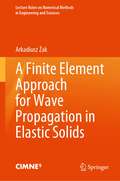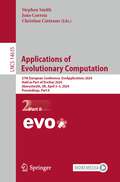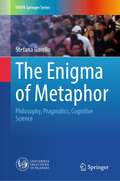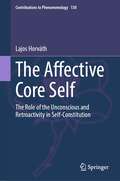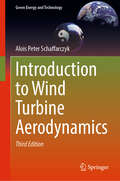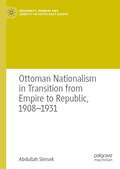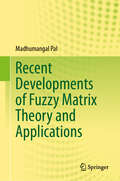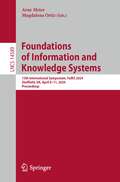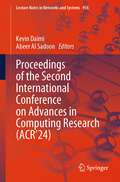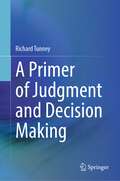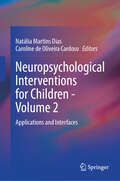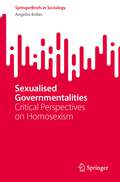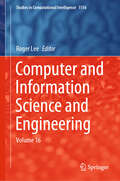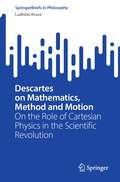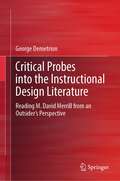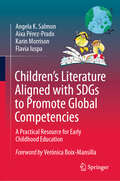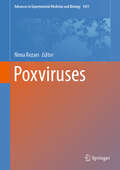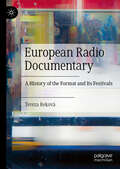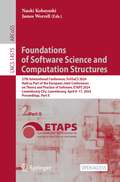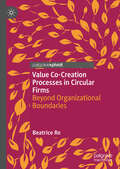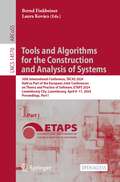- Table View
- List View
Law and Economics of Justice: Efficiency, Reciprocity, Meritocracy (Economic Analysis of Law in European Legal Scholarship #17)
by Klaus Mathis Avishalom TorWhile previous volumes have examined specific issues and developments such as the coronavirus crisis or digital transformation from a law and economics perspective, the anniversary edition returns to the methodological and philosophical fundament of the discipline of law and economics. The present book aims to examine these foundations in general and, in particular, efficiency, reciprocity and meritocracy, and their relation to law and justice from an interdisciplinary perspective.Efficiency: Traditionally, the economic analysis of law has been guided by the goal of efficiency. Economists usually define efficiency as Pareto or Kaldor–Hicks efficiency. Any change that makes one member of society better off without anyone else being worse off is a Pareto improvement. A change is a Kaldor–Hicks improvement if the gainers value their gains more than the losers value their losses, with only hypothetical compensation required.Reciprocity: Economists have traditionally basedtheir models on the self-interest hypothesis of homo oeconomicus. In this model, an individual maximises his own utility without being altruistic or jealous. Behavioural economics challenges the self-interest hypothesis. In fact, many people deviate from purely self-interested behaviour. There are also signs that considerations of fairness and mutual benefit are important in bilateral negotiations and in the functioning of markets. Meritocracy: The concept of meritocracy refers to a system, organisation, or society in which people are selected and promoted to positions of success, power, and influence on the basis of their abilities and merits. This means that an individual is able to climb the social ladder through hard work. Moreover, meritocracy directs the most talented people into the most functionally important positions, thereby increasing a society's efficiency. However, the equalising function of meritocracy has been criticised. Rather than reducing inequality, meritocracy is seen as the cause of racial, economic and social inequality.
Cell Biology and Translational Medicine, Volume 21: Stem Cell in Lineage, Secretome Regulation and Cancer (Advances in Experimental Medicine and Biology #1450)
by Kursad TurksenMuch research has focused on the basic cellular and molecular biological aspects of stem cells. Much of this research has been fueled by their potential for use in regenerative medicine applications, which has in turn spurred growing numbers of translational and clinical studies. However, more work is needed if the potential is to be realized for improvement of the lives and well-being of patients with numerous diseases and conditions.This book series 'Cell Biology and Translational Medicine (CBTMED)' as part of Springer Nature’s longstanding and very successful Advances in Experimental Medicine and Biology book series, has the goal to accelerate advances by timely information exchange. Emerging areas of regenerative medicine and translational aspects of stem cells are covered in each volume. Outstanding researchers are recruited to highlight developments and remaining challenges in both the basic research and clinical arenas. This current book is the 21stvolume of a continuing series.
A Finite Element Approach for Wave Propagation in Elastic Solids (Lecture Notes on Numerical Methods in Engineering and Sciences)
by Arkadiusz ŻakThis book focuses on wave propagation phenomena in elastic solids modelled by the use of the finite element method. Although the latter is a well-established and popular numerical tool used by engineers and researchers all around the word the process of modelling of wave propagation can still be a challenge. The book introduces a reader to the problem by presenting a historical background and offering a broad perspective on the development of modern science and numerical methods. The principles of wave phenomena are clearly presented to the reader as well as the necessary background for understanding the finite element method, which is the following chapter of the book is viewed from the modeller point-of-view. Apart from the principles the book also addresses more advanced topics and problems including the use of the spectral-finite element method, the spline-based finite element method as well as the problems of undesired and hidden properties of discrete numerical models.
Applications of Evolutionary Computation: 27th European Conference, EvoApplications 2024, Held as Part of EvoStar 2024, Aberystwyth, UK, April 3–5, 2024, Proceedings, Part II (Lecture Notes in Computer Science #14635)
by Stephen Smith João Correia Christian CintranoThe two-volume set LNCS 14634 and 14635 constitutes the refereed proceedings of the 27th European Conference on Applications of Evolutionary Computation, EvoApplications 2024, held as part of EvoStar 2024, in Aberystwyth, UK, April 3–5, 2024, and co-located with the EvoStar events, EvoCOP, EvoMUSART, and EuroGP.The 51 full papers presented in these proceedings were carefully reviewed and selected from 77 submissions. The papers have been organized in the following topical sections: applications of evolutionary computation; analysis of evolutionary computation methods: theory, empirics, and real-world applications; computational intelligence for sustainability; evolutionary computation in edge, fog, and cloud computing; evolutionary computation in image analysis, signal processing and pattern recognition; evolutionary machine learning; machine learning and AI in digital healthcare and personalized medicine; problem landscape analysis for efficient optimization; softcomputing applied to games; and surrogate-assisted evolutionary optimisation.
The Enigma of Metaphor: Philosophy, Pragmatics, Cognitive Science (UNIPA Springer Series)
by Stefana GarelloThis book deals with the complicated realm of metaphor, an enigma deeply embedded in language and cognition. There has been much discussion of metaphor in the past, but it was characterized by a certain fragmentation and lacked interdisciplinarity. In this field of study, the dominance of Cognitive Linguistics, epitomized by the Conceptual Metaphor Theory of George Lakoff and Mark Johnson, has caused the marginalization of alternative perspectives. To fill this gap, this book embarks on an interdisciplinary journey, inviting different theoretical frameworks to engage in a fruitful dialog. It navigates the labyrinth of theories and illuminates the nuanced facets of metaphor.At the center of this exploration are three central questions: whether metaphor belongs to the realm of style or thought, the intricate interplays between literal and metaphorical meanings and the integration of propositional and non-propositional elements in the construction of metaphorical meaning.Through a careful blend of historical analysis and contemporary hypotheses, the book unravels the complexities of metaphor, considering its evolution across the centuries and the myriad interpretations it evokes. By bringing together work from different fields, it ultimately shows that a definition of metaphor is theory-dependent and that metaphor is not a natural kind, but a complex and multifaceted philosophical concept whose study requires a multi-dimensional approach that transcends narrow theoretical boundaries. In this way, the book explores these considerations’ most important philosophical consequences and offers new insights into this fundamental aspect of human language.
The Affective Core Self: The Role of the Unconscious and Retroactivity in Self-Constitution (Contributions to Phenomenology #130)
by Lajos HorváthThis book extends the contemporary concept of the minimal self by introducing the affective core self. The overall aim is to integrate certain psychoanalytical ideas into the phenomenological investigation of passivity and reformulate the idea of the phenomenological unconscious. This volume contributes to the multidimensional analysis of the self by positioning the affective core self between the layers of the more minimal and the less minimal self. It underscores the importance of the unconscious in the constitution of the affective core self by providing the comparative analysis of the phenomenological and the psychoanalytical unconscious.Furthermore, comparisons are drawn between Freud’s conception of the afterwardsness of trauma and the phenomenological notion of retroactive sense-constitution. The book concludes that retroactive sense-making is a double-sided phenomenon and differentiates between implicit-bodily and conscious-narrative retroactive sense-constitution. In order to bolster the idea of implicit-bodily sense-constitution the volume also examines and utilizes contemporary insights on the nature of body memory. The conclusion claims that the affective core self is constituted in time by means of the underlying processes of the two-sided retroactive sense-constitution. This text appeals to students and researchers working in phenomenology and philosophy of mind.
Introduction to Wind Turbine Aerodynamics (Green Energy and Technology)
by Alois Peter SchaffarczykThis book is an introduction to wind turbine aerodynamics for professionals and students with a diverse range of backgrounds. It is a self-contained textbook that shows how to progress from the basics of fluid mechanics to modern wind turbine blade design. It presents the fundamentals of fluid dynamics and inflow conditions, as well as extensive information on theories describing the aerodynamics of wind turbines. After examining a number of related experiments, the book applies the lessons learned to blade design.The text of this 3rd edition has been thoroughly revised, and the book includes a new section on aerodynamic design and optimization.
Ottoman Nationalism in Transition from Empire to Republic, 1908–1931 (Modernity, Memory and Identity in South-East Europe)
by Abdullah SimsekThis book deals with the complex process of national identity formation in the late Ottoman Empire and early Turkish Republic, during a crucial period characterized by transformative events that reshaped both the state and society. These events included revolutions, wars, mass migrations, ethnic cleansing, genocide, the empire's disintegration, territorial and demographic changes, and the emergence of new states. In the face of these events, a multitude of old and new formulations and imaginings of nation and national identity took shape and interacted with each other. This book focuses on highlighting the diversity of concepts and trajectories that existed during the period and how these played out within a complex web of inclusionary and exclusionary processes, and the various ways in which the nation was constituted and conceptualized.
Recent Developments of Fuzzy Matrix Theory and Applications
by Madhumangal PalThis book provides a comprehensive overview of the development of fuzzy matrix theory from its inception to its current state. It covers various types of fuzzy matrices, such as intuitionistic fuzzy matrices, interval-valued fuzzy matrices, interval-valued intuitionistic fuzzy matrices, bipolar fuzzy matrices, picture fuzzy matrices, neutrosophic fuzzy matrices, m-polar fuzzy matrices and similar one. Drawing primarily from the author's research work and collaborations, the book offers a state-of-the-art discussion of these topics. Theoretical concepts are illustrated with examples for clarity, accompanied by figures depicting fuzzy matrices and their variations. Suitable for both beginners and expert researchers, the book offers a wealth of material and includes numerous open problems at the end of almost all chapters to encourage further exploration and investigation.
Foundations of Information and Knowledge Systems: 13th International Symposium, FoIKS 2024, Sheffield, UK, April 8–11, 2024, Proceedings (Lecture Notes in Computer Science #14589)
by Arne Meier Magdalena OrtizThis LNCS conference volume constitutes the proceedings of the 13th International Symposium, FoIKS 2024, in Sheffield, UK, in April 2024. The 18 full papers together with 3 short papers included in this volume were carefully reviewed and selected from 42 submissions.The Symposium focuses on fundamental aspect of information and knowledge systems, including submissions that apply ideas, theories, or methods from specific disciplines to information and knowledge systems. Examples of such disciplines are discrete mathematics, logic and algebra, model theory, databases, information theory, complexity theory, algorithmics and computation, statistics, and optimization.
Cellular Automata Technology: Third Asian Symposium, ASCAT 2024, Durgapur, India, February 29–March 2, 2024, Revised Selected Papers (Communications in Computer and Information Science #2021)
by Mamata Dalui Sukanta Das Enrico FormentiThis book constitutes the refereed conference proceedings of the Third Asian Symposium on Cellular Automata Technology, ASCAT 2024, held in Durgapur, India, during February 29 - March 2, 2024.The 15 full papers presented in this book were carefully reviewed and selected from 33 submissions. The symposium aims to explore the latest advancements, methodologies, and interdisciplinary connections that showcase the versatility and potential impact of cellular automata in contemporary research.
Proceedings of the Second International Conference on Advances in Computing Research (Lecture Notes in Networks and Systems #956)
by Kevin Daimi Abeer Al SadoonThis book concentrates on advances in research in the areas of computational intelligence, cybersecurity engineering, data analytics, network and communications, cloud and mobile computing, and robotics and automation. The Second International Conference on Advances in Computing Research (ACR’24), June 3–5, 2024, in Madrid, brings together a diverse group of researchers from all over the world with the intent of fostering collaboration and dissemination of the advances in computing technologies. The conference is aptly segmented into six tracks to promote a birds-of-the-same-feather congregation and maximize participation. It introduces the concepts, techniques, methods, approaches, and trends needed by researchers, graduate students, specialists, and educators for keeping current and enhancing their research and knowledge in these areas.
A Primer of Judgment and Decision Making
by Richard TunneyThe book is intended as a primer and discusses the main areas within judgment and decision making. However, these topics are not siloed. Instead, a narrative arc throughout the book has a higher level of critical appraisal of the key concepts and how they relate to some of the big questions about the nature of human rationality. The book begins by introducing two perspectives on rationality. The first describes how we decide on the goodness of a decision. This is a surprisingly recent concept called Rational Choice Theory, which was formed from a collection of books written around the time of the Second World War, that deal with how we think about risk as a probability and goodness as utility. In short, Rational Choice Theory argues that to be rational, people should always make the decision that maximizes subjective expected utility. The book goes on to describe the consensus view that emerged in the late 1960s and came to dominate our thinking about decision making, namely that people rarely make rational decisions. In fact, many Nobel prizes have been handed out for work showing that humans are not rational creatures (e.g. Daniel Kahneman, Richard Thaler, Robert Shiller). The book concludes with recent theoretical developments in our understanding of how people make decisions that reconcile Rational Choice Theory with human irrationality. Although aimed primarily at second year undergraduates studying judgement and decision making as a core component of cognitive psychology, the book will also be relevant to third year electives in and MSc programmes. The book will also interest undergraduates studying economics, and undergraduates studying more general degrees in liberal arts or natural science. As an introductory text the book assumes no prior knowledge of judgement and decision making, cognitive psychology or economics. However, the level of the book assumes that the reader is familiar with academic texts and has experience of critical thinking. A key requirement of the reader is a willingness to relate academic concepts to the real world, and to try and understand the bigger picture about human psychology and its place in society.
Neuropsychological Interventions for Children - Volume 2: Applications and Interfaces
by Caroline de Oliveira Cardoso Natália Martins DiasThis book is the second of two volumes that aim to serve as a comprehensive guide for professionals working with neuropsychological interventions especially designed for children. This second volume complements the theoretical and practical foundations presented in the first volume by presenting applications to different clinical conditions and by exploring interfaces of neuropsychology with other areas of research and practice. Chapters in this second volume are divided into two parts. The first part presents a series of case studies, illustrating the practice and experience of neuropsychological rehabilitation and habilitation in different clinical conditions. The second part brings together chapters that discuss the interfaces of neuropsychology with different areas, which can use its knowledge and interventions (such as school neuropsychology) or which can be used as strategies within neuropsychological intervention or even compose inter and transdisciplinary partnerships in the work of promotion, stimulation, or cognitive remediation, such as the use and role of music, games and play, mindfulness, and transcranial direct current stimulation. So, chapters in this second part highlight the interfaces with other approaches, knowledges or disciplines. Originally published in Portuguese and now available in English, Neuropsychological Interventions for Children – Volumes 1 and 2 will be of interest to professionals working with neuropsychology in clinical and school contexts. It will also be useful in neuropsychology teaching contexts (specialization courses in neuropsychology and related areas) and for students and professionals in interface areas, such as Psychology, Education, Speech Therapy, Occupational Therapy among others. The translation of the original Portuguese version of this book into English was done with the help of artificial intelligence. A subsequent human revision was done primarily in terms of content.
Sexualised Governmentalities: Critical Perspectives on Homosexism (SpringerBriefs in Sociology)
by Angelos BollasThis book critically examines the concept of sexualised governmentalities, a framework for understanding the evolving discourse and power dynamics surrounding discrimination on the basis of sexual practices. Central to this exploration is the shift from traditional heteronormative perspectives to a more complex hetero/homonormative context, where the structure and organisation of sexual relationships gain prominence over the gender or sexual orientation of the participants. A key focus of the book is the concept of homosexism within the realm of gay masculinity studies. The author discusses homosexism as a form of discrimination experienced by gay men from other gay men, highlighting the influence of heteronormative patriarchal society on these interactions. It calls for a broader recognition and acceptance of diverse sexual expressions and challenges the reader to re-evaluate the societal norms around masculinity and sexual behaviour. Sexualised Governmentalities is an important contribution to the discourse on sexual identity and practice, offering insights for a more inclusive and empathetic understanding of sexual diversity.
Computer and Information Science and Engineering: Volume 16 (Studies in Computational Intelligence #1156)
by Roger LeeThis book reports state-of-the-art results in Computer Information Science and Engineering in both printed and electronic form. Studies in Computation Intelligence (SCI) has grown into the most comprehensive computational intelligence research forum available in the world.
Descartes on Mathematics, Method and Motion: On the Role of Cartesian Physics in the Scientific Revolution (SpringerBriefs in Philosophy)
by Ladislav KvaszThis book argues that Descartes’ physics was a milestone on the road to modern mathematical physics. After Newton introduced a completely different approach to mathematical description of motion, Descartes’ physics became obsolete and even difficult to comprehend. This text follows the language of Descartes and the means of which motion can be described. It argues that Descartes achieved almost everything that later Newton was able to do—to describe the motion of interacting bodies- by different (i.e. algebraic) means. This volume completely refutes the received view according to which Descartes’ physics was merely a kind of discursive natural philosophy. To make this interpretation more plausible the book follows Descartes’ ideas from his early work in mathematics, through his invention of the analytic method towards his mature physics. It shows that Descartes followed a similar heuristic pattern.The volume appeals to students and researchers; it invites the reader equippedwith minimal understanding of college mathematics to follow Descartes on his intellectual journey through the Scientific Revolution. The reader will gain a deeper understanding of the role of mathematical language in the creation of modern physics and a glimpse into the fascinating world of Descartes’ scientific thought. Several of Descartes’ philosophical ideas can be traced back to his scientific interests and thus the book elucidates the motivation behind some of Descartes’ key positions in the area of epistemology and method. In the penultimate chapter the book presents four arguments in favor of seeing Descartes as a physicist on par with Galileo and Newton.
Critical Probes into the Instructional Design Literature: Reading M. David Merrill from an Outsider’s Perspective
by George DemetrionThis book provides a comprehensive study of the work of M. David Merrill, a major pioneer in the field of instructional design. This book centers on his research on his second generation instructional design (ID2) theory, Instructional Transaction Theory, and First Principles of Instruction, which has had a substantial impact on the instructional design field. It’s appealing to the instructional design research and practitioner-based communities who can draw on specific sections of this book to enhance their own work. It is also intended for those seeking to learn more about the relationship between the instructional design field, learning theory, curriculum studies, and lifelong learning/adult education studies. Through this critical, yet empathetic study of Merrill’s 50+ year research agenda, this book provides an illuminating field of entry into a broad range of topics, both those that are central to Merrill’s own research agenda, and into areas that extend well beyond his essentially cognitivist epistemological assumptions.
Children’s Literature Aligned with SDGs to Promote Global Competencies: A Practical Resource for Early Childhood Education
by Angela K. Salmon Aixa Pérez-Prado Karin Morrison Flavia IuspaThis book presents children’s literature as a platform for learning and helping young readers develop the knowledge, skills, and attitudes needed to thrive in an interconnected and diverse global society. It draws from various theoretical frameworks and research findings to implement critical literacy and culturally responsive teaching in the meaning-making process.The book focuses on global competencies and Sustainable Development Goals (SDGs) as intertwined concepts that work together to foster a more sustainable, inclusive, and equitable world. Developing global competencies empowers children and communities to actively participate in achieving the SDGs and addressing the pressing challenges of our time. The authors set high expectations on children as actors in transforming society. To facilitate this, the book offers an overview of child development theories as a foundation for designing developmentally appropriate practices to extend children’s books toward deep thinking and understanding. The book includes sample lessons that use cutting-edge research-based pedagogies and tools such as visible thinking routines and other approaches. Those lessons also help readers identify the Habits of Mind (HOM) children can develop by listening to and discussing stories. The HOM are attributes of good problem-finders and problem-solvers needed when confronting complex issues. The book provides resources and sample lessons that implement different thinking strategies to engage children in questioning and analyzing what they read, making them more critical. This is how children deeply understand the world and their role in creating positive change. The book aims to cultivate change-makers and global citizens through stories. It offers innovative approaches, including online learning options in accessible and engaging ways to help children think globally and act locally‘Through the power of children’s literature, this book serves a larger agenda: To build a more thoughtful world for future generations. By caring for and learning from one another through suggested activities in this book, they will share the riches and resources from across the world. As children learn about the promise of actions toward the UN Sustainable Goals, they can imagine living in an interdependent learning community where all people continually searching for ways to trust each other, learn together, and grow toward greater intelligence.’ Arthur Costa and Bena Kallick, Co-Founders and Directors of The Institute for Habits of Mind
Organisation und Führung in turbulenten Zeiten: Entwurf und Implementierung unter Verwendung des 3-P-Modells
by Peter Wollmann Frank Kühn Michael Kempf Reto PüringerDieses Buch knüpft an die erfolgreiche Entwicklung des Drei-Säulen-Modells (3-P-Modell) der Autoren für die Organisation und Führung in disruptiven Zeiten an. Der Schwerpunkt liegt darauf, dem Leser bei der Umsetzung des Modells zu helfen und eine Vielzahl von Anwendungsfällen für diese VUCA-Zeiten (Volatilität, Ungewissheit, Komplexität und Mehrdeutigkeit), einschließlich globaler Krisen wie der COVID-19-Pandemie, zu liefern. Das Buch deckt ein breites Spektrum von Organisationen ab: privater und öffentlicher Sektor, Nichtregierungsorganisationen, lokale und globale Regierungsinstitutionen, globale Organisationen wie die UNO usw. Darüber hinaus wird aufgezeigt, wie das 3-P-Modell auf Herausforderungen bei der Organisationsgestaltung, dem Management und der Führung angewendet werden kann.
Poxviruses (Advances in Experimental Medicine and Biology #1451)
by Nima RezaeiSince the emergence of 2022’s monkeypox virus (MPXV) outbreak, it has been the heading of news and research articles that MPXV is being involving non-endemic areas after about its 80-year presence in endemic areas. Efforts are concentrated on understanding how MPXV has evolved to cause an epidemic. The book provides a comprehensive compendium of chapters on poxviruses in different domains. It concludes that the main problem we should deal with is not to address how MPXV has overcome the distance between non-endemic and endemic areas, but it is the non-cooperativity of logistics, research, and science in managing poxviruses’ outbreaks.
European Radio Documentary: A History of the Format and Its Festivals
by Tereza RekováThis book studies the history and significance of radio documentaries in Europe, and the institutions that are specialized on this genre. Focused on the 50-year history of the International Feature Conference (an annual gathering of radio documentarians from around the world), the book discusses the Prix Europa, Prix Italia, the Third Coast International Audio Festival, and the HearSay Audio Arts Festival. The book tells the story of people who chose sound as their lifestyle and who spread their passion worldwide.
Foundations of Software Science and Computation Structures: 27th International Conference, FoSSaCS 2024, Held as Part of the European Joint Conferences on Theory and Practice of Software, ETAPS 2024, Luxembourg City, Luxembourg, April 6–11, 2024, Proceedings, Part II (Lecture Notes in Computer Science #14575)
by Naoki Kobayashi James WorrellThe two open access volumes LNCS 14574 and 14575 constitute the proceedings of the 27th International Conference on Foundations of Software Science and Computation Structures, FOSSACS 2024, which took place in Luxembourg in April 2024.The 24 full papers included in this book were carefully reviewed and selected from 79 submissions. They were organized in topical sections as follows: Part I: Infinite games; categorical semantics; automata and synthesis; Part II: Types and programming languages; logic and proofs; infinite-state systems.
Value Co-Creation Processes in Circular Firms: Beyond Organizational Boundaries
by Beatrice ReThis book investigates value co-creation processes within the context of circular entrepreneurship. By rooting the book in value co-creation theory, the author addresses the following research questions: How do value co-creation processes impact organizations? And how could circular firms gain legitimacy through value co-creation processes? Through an empirical study based on interviews with circular entrepreneurs and focus groups involving both entrepreneurs and a sample of co-creating customers, the author offers an empirical framework of value co-creation processes and resulting organizational changes. The book is informative for both academics and practitioners. From a theoretical point of view, it contributes to value co-creation theory, the growing circular entrepreneurship literature, and organizational studies. From a managerial perspective, it informs aspiring circular entrepreneurs and managers about the potential of value co-creation processes in supporting their firms in gaining legitimacy and becoming learning organizations.
Tools and Algorithms for the Construction and Analysis of Systems: 30th International Conference, TACAS 2024, Held as Part of the European Joint Conferences on Theory and Practice of Software, ETAPS 2024, Luxembourg City, Luxembourg, April 6–11, 2024, Proceedings, Part I (Lecture Notes in Computer Science #14570)
by Bernd Finkbeiner Laura KovácsThe open access book 3-volume set LNCS 14570-14573 constitutes the proceedings of the 30th International Conference on Tools and Algorithms for the Construction and Analysis of Systems, TACAS 2024, which was held as part of the European Joint Conferences on Theory and Practice of Software, ETAPS 2024, during April 6-11, 2024, in Luxembourg.The 53 full papers and 16 short SVComp contributions included in these proceedings were carefully reviewed and selected from 159 submissions. They were organized in topical sections as follows:Part I: STA and SMT solving; synthesis; logic and decidability; program analysis and proofs; proof checking; Part II: Model Checking; automata and learning; software verification; probabilistic systems; simulations; Part III: Neural networks; testing and verification; games; concurrency; SV-Comp 2024.


